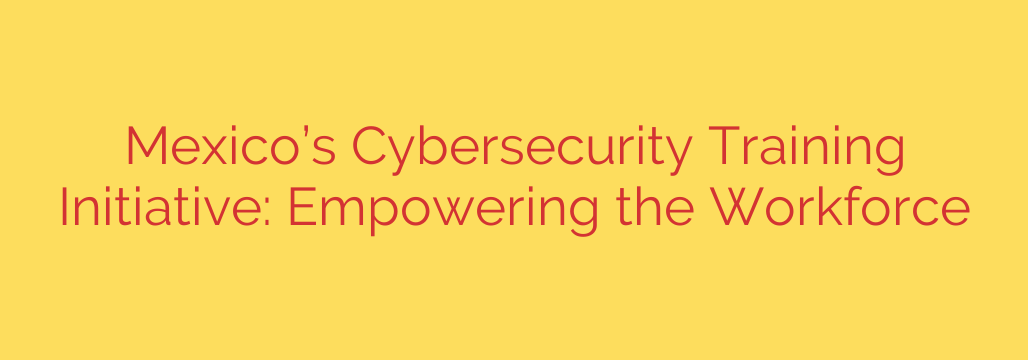
Fortifying the Future: How Mexico is Building a World-Class Cybersecurity Workforce
In an increasingly connected world, the digital landscape is fraught with sophisticated threats. For nations undergoing rapid digital transformation, the need for a robust cybersecurity defense has never been more critical. Mexico, recognizing this urgent need, is taking a decisive step forward to protect its digital borders and empower its citizens.
Instead of waiting for a crisis, Mexico is proactively addressing the cybersecurity skills gap through a significant national training initiative. This strategic move aims to cultivate a new generation of security professionals capable of defending the nation’s critical infrastructure and burgeoning digital economy.
The Challenge: A Growing Digital Frontier and its Risks
As more businesses and government services in Mexico move online, the surface area for cyberattacks expands. From financial institutions to energy grids and public records, vital assets are now connected to the internet, making them potential targets for malicious actors.
The primary obstacle has been a shortage of trained professionals. The demand for cybersecurity experts far outpaces the available supply, creating a dangerous vulnerability. This skills gap not only jeopardizes national security but also hinders economic growth by making businesses hesitant to fully embrace digital innovation.
A Strategic National Response: Investing in Human Capital
To close this gap, a comprehensive initiative has been launched, bringing together government agencies, academic institutions, and leading technology companies. This powerful collaboration focuses on creating a sustainable pipeline of talent through targeted education and hands-on training.
The core components of this initiative include:
- Specialized Curriculum Development: Programs are being designed to cover the most critical areas of modern cybersecurity, including network defense, ethical hacking, threat intelligence, cloud security, and data privacy.
- Public-Private Partnerships: By partnering with global tech leaders, the initiative ensures that the training provided is relevant, up-to-date, and aligned with industry best practices and certifications. This gives participants a direct path to meaningful employment.
- Upskilling the Existing Workforce: The program isn’t just for new students. It also focuses on upskilling current IT professionals and government employees, equipping them with the specific security skills needed to protect the organizations they already serve.
- Fostering a Security-First Culture: Beyond technical training, the initiative aims to promote a broader awareness of cybersecurity issues across all sectors of society, encouraging a collective sense of responsibility for digital safety.
The Broader Impact on Mexico’s Digital Economy
The benefits of this investment extend far beyond simply preventing cyberattacks. By building a strong domestic cybersecurity workforce, Mexico is positioning itself for a more prosperous and secure future.
A skilled workforce strengthens national security by reducing reliance on foreign expertise and building a self-sufficient defense capability. Furthermore, it makes the country a more attractive destination for foreign investment. International companies are far more likely to establish operations in a country that can demonstrate a secure digital environment and a ready supply of local security talent.
Ultimately, this initiative empowers individuals with high-demand, well-paying career opportunities, contributing to economic mobility and creating a stronger middle class.
Actionable Security Tips for Businesses and Individuals
While national initiatives are crucial, everyone has a role to play in maintaining digital security. Here are some fundamental steps you can take today:
For Businesses:
- Invest in Continuous Employee Training: Your staff is your first line of defense. Regular training on phishing, social engineering, and secure data handling is essential.
- Implement Multi-Factor Authentication (MFA): Require MFA for all critical systems, including email, VPN, and financial applications. This is one of the single most effective security measures.
- Conduct Regular Security Audits: Proactively scan your networks and applications for vulnerabilities and patch them immediately.
- Develop an Incident Response Plan: Know exactly what to do when a security breach occurs to minimize damage and ensure a swift recovery.
For Individuals:
- Use Strong, Unique Passwords: Combine letters, numbers, and symbols. Use a password manager to create and store complex passwords for different accounts.
- Be Skeptical of Unsolicited Communications: Do not click on suspicious links or download attachments from unknown senders. Verify requests for personal information through a separate, trusted channel.
- Keep Your Software Updated: Enable automatic updates for your operating system, web browser, and applications to ensure you have the latest security patches.
By focusing on the power of education and strategic partnerships, Mexico is not just defending against today’s threats—it is building a resilient and thriving digital nation for generations to come. This investment in human capital is the ultimate defense in the ongoing battle for digital security.
Source: https://www.tripwire.com/state-of-security/building-cyber-aware-workforce-mexicos-push-security-training








